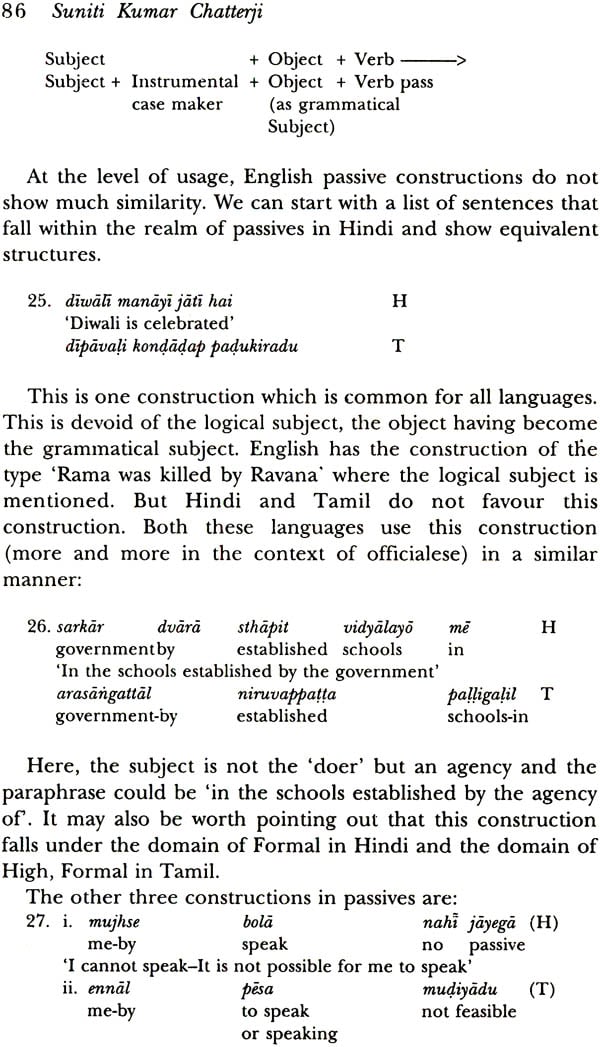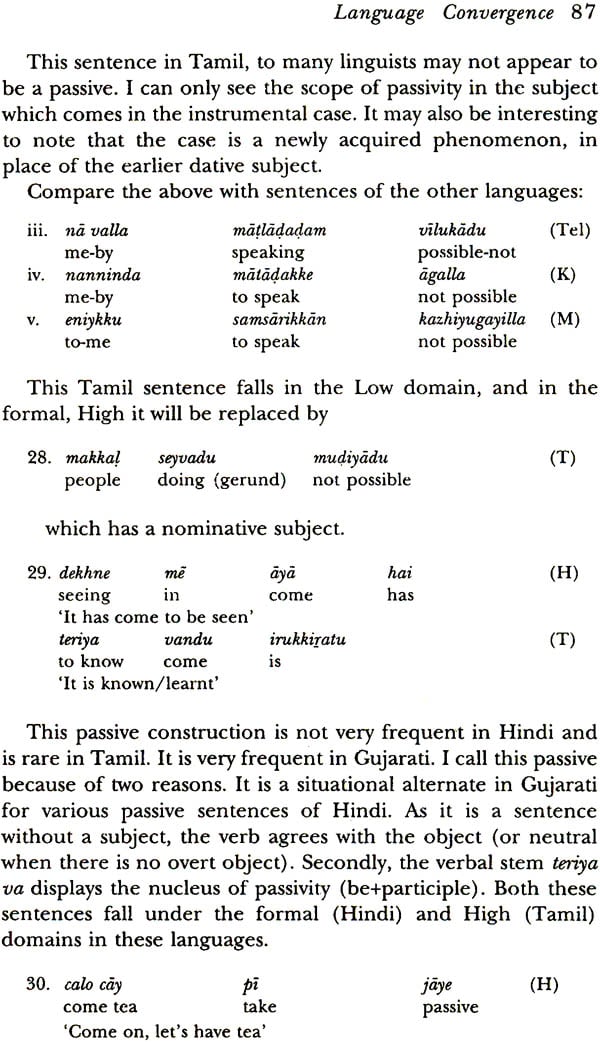
SUNITI KUMAR CHATTERJI: A Centenary Tribute
Book Specification
| Item Code: | IDG255 |
| Author: | Udaya Narayana SinghShivarama Padikkal |
| Publisher: | Sahitya Akademi, Delhi |
| Language: | English |
| Edition: | 1997 |
| ISBN: | 8126003537 |
| Pages: | 230 |
| Cover: | Hardcover |
| Other Details | 8.5"X5.5" |
| Weight | 340 gm |
Book Description
About the Book:
This is a collection of select papers from the proceedings of the National Seminar on 'Suniti Kumar Chatterji: An End-Century Assessment' jointly organised by the Sahitya Akademi and the Centre for Applied Linguistics and Translation Studies, University of Hyderabad in November 1989.
Late Prof. Suniti Kumar Chatterji, former President of the Akademi, a public figure and a man of letters was a sage, seer and scholar all in one. The contributors of this volume discuss his pioneering and scholarly works in linguistics and literature and asses his contributions to modern India as a social thinker and as a great visionary and practical humanist. Though these discussions centre around Suniti Kumar's conceptualisation of language, literature and society, they are no less important for our own understanding of modern India as a nation-state, for, the strengths and weaknesses of Suniti Kumar's theoretical models and humanism are presented in the light of current developments in theory and society.
This volume features tributes to the scholar, base papers and panel discussions.
About the Author:
Udaya Narayana Singh is a linguist by training, a creative writer (with plays and poems in Maithili) by choice and a literary critic (mainly writing in Bengali) by conviction. Udaya Narayana Singh was educated at Sanskrit College, Calcutta and later taught at the University of Delhi. He is currently a Professor of Linguistics at the University of Hyderabad where he also heads the Centre for Applied Linguistics and Translation Studies. He has a Ph. D (1979) from Delhi University on Syntactic Theory.
Shivarama Padikkal was educated at Mysore University. He did his M.A. from Bangalore University and has a Ph. D. from Mangalore University for his work on the Emergence of the Kannada Novel. He is currently working as a lecturer at the Centre for Applied Linguistics and Translation Studies, University of Hyderabad.
Excerpts from Review:
NARRATIVE: A SEMINAR
Ed. Amiya Dev
The first-hand testament of creative writers on the various aspects of the art of narrative-a must for academics, interested readers and for libraries.
UNIVERSALITY OF MAN: THE MESSAGE OF ROMAIN ROLLAND
Ed. Sibnarayan Ray
Compilation of papers presented by eminent writers, thinkers and academicians of India and France on Romain Rolland, French writer, musician, biographer, mystic and humanist covering a wide range of issues having bearing on his life-long concerns. Stimulates readers' further thinking on the nature and problems of the universality of man.
NATIVISM (ESSAYS IN CRITICISM)
Ed. Makarand Paranjape
The fifteen essays included in this book introduced and define the concept of Deshivad, analyse its classical, medieval and colonial backgrounds, trace its evolution into a contemporary critical tool, debate its strengths and weaknesses and attempt to put it into practice by applying it to contemporary literary works.
CREATIVE ASPECTS OF INDIAN ENGLISH
Ed. Shantinath K. Desai
Collection of seminar papers presented by eminent writers and critics, focussing on the Indian writers' problems, characteristics of Indian English, writing and problems of translation of Indian literature into English.
The second part contains poems of Jayanta Mahapatra, Keki Daruwalla, Keshav Malik, Prabhanjan K. Mishra and Agha Shahid Ali which were read out during the Seminar.
We, at the Centre for Applied Linguistics & Translation Studies, University of Hyderabad, are obviously very happy that this tribute to one of the finest minds that India had produced in the field of human sciences in general, and linguistics in particular, has finally seen the light of publication, thanks mainly to the persuasive efforts of Prof. Indra Nath Choudhuri, Secretary, Sahitya Akademi. We are also grateful to Dr. Birendra Kumar Bhattacharyya, the former President of the Akademi and Prof. U.R. Ananthamurthy, the current President, for supporting this project. The Akademi had not only financially supported the Conference, it had also enriched the discussion by bringing in its two regional secretaries from Calcutta (Nirmal Kanti Bhattachaya) and Bangalore (Agrahara Krishnamurthi). Ms. Gitanjali Chatterjee has also been very helpful and understanding.
Dr. Birendra Kumar Bhattacharyya had been kind enough to have given an inspiring talk in the inaugural session but we could not include it because of non-availability of its written form. The encouragement and advice given by our former Vice-Chancellor, Prof. Bh. Krishnamurti-a linguist of international reputation himself, are worth recalling. He was also kind to have readily agreed to give an inaugural address on Prof. S.K Chatterji's work, which is included here. We are grateful to yet another renowned linguist and former Vice- Chancellor of the CIEFL, Prof. S.K Verma, for delivering the valedictory address which has also been included. Professors Gangadhar Gadgil, Asit Kumar Bandyopadhyay, K Kunjunni Raja, V. D. Singh, V. I. Subramoniam and Dr. Sujit Mukherjee kindly presided over different academic sessions.
We are deeply indebted to all those scholars who readily accepted our invitation to participate in the conference either as base paper writers or as commentators or to deliver special lectures. A list of contributors is given at the end of the volume. There are many more whom we had invited and who could not come at the last moment. Most speakers had brought written scripts and most lectures were circulated. We had recorded (thanks to the efforts of J. Prabhakara Rao, N. Krupanandam, and Dipti Misra Sharma) some of those who made only oral presentation and prepared a transcript (a tiring work done with meticulousness by K Usha Kiran) to check with the speakers. We would have liked to include discussions too in this volume but the recorded voice was not audible in most cases, and hence we had to drop the idea. Two speakers (Professors R.N. Srivastava and S.R. Banerjee) had promised to give us a modified version of their presentations but could not. We have made modifications in Professor Srivastava's paper to the best of our ability and included it. the collection would have surely been richer had we received Prof. Banerjee's essay as well as written presentations by Col. Narender Pal Singh, and Professors B. V. L. Narayana Row, C. J. Daswani and B. P. Mahapatra. Those who helped us in various ways during the conference-our research students, office staff and faculty-all deserve thanks. Professor G. V. Subrahmanyam, who was the Dean, School of Humanities, at that time, was very helpful. We are also grateful to the rapporteurs of different sessions who included the following: Professors B. Ramakrishna Reddy, K K Ranganadhacharyulu, Probal Dasgupta, Pramod Kumar Pandey, P. Ramanarasimham, Makarand Paranjape, and Panchanan Mohanty. Shri and Smt. Suman Chatterji, son and daughter-in-law of Professor S. K Chatterji, who also participated in the conference and gave us some rare photographs of Prof. Chatterji deserve special thanks.
The volume would not have been brought out without the untiring effort of P.Y.S.R. Murthy and Darius Charles who both typed and put the manuscript on DTP. The electronic copy of. the entire manuscript, however, had to be recast in another software, in which Professor Rajeev Sangal had kindly helped us. We are particularly grateful to Suchita Singh for her help in proof-reading.
| Preface | viii | |
| | ||
| 1. | Welcome Address | 3 |
| INDRA NATH CHOUDHURI | ||
| 2. | Professor Suniti Kumar Chatterji (1890-1977): A Centenary Tribute | 7 |
| BH. KRISHNAMURTI | ||
| | ||
| 3. | Suniti Kumar Chatterji as a Grammarian | 15 |
| PABITRA SARKAR | ||
| 4. | Chatterji's Perception of the Language | 24 |
| E. ANNAMALAI | ||
| 5. | Suniti Kumar Chatterji on English in India | 29 |
| SHIVENDRA K. VERMA | ||
| 6. | Perspectives in the Studies of New Indo-Aryan | 37 |
| SURAJ BHAN SINGH | ||
| 7. | S. K. Chatterji and NIA | 54 |
| D. P. PATTANAYAK | ||
| 8. | Chatterji-as a Lexicographer | 62 |
| R. A. SINGH | ||
| 9. | Chatterji's Contribution to the Notion of 'India as a Linguistic Area' | 72 |
| K. V. SUBBARAO | ||
| 10. | Language Convergence: Confluence of the Codes | 81 |
| V. R. JAGANNATHAN | ||
| 11. | Indo-Iranian: Some Observations on Discourse | 91 |
| PREM SINGH | ||
| 12. | Varieties of Hindi | 99 |
| B. LAKSHMI BAI | ||
| 13. | Chatterji as a Phonetician and Phonologist | 107 |
| R. N. SRIVASTAVA | ||
| 14. | Advances in Phonological Theory | 115 |
| K. G. VIJAYAKRISHNAN | ||
| 15. | Experiments in Telugu Metres | 126 |
| C. RAMARAO | ||
| | ||
| Base Paper I | ||
| 16. | The Singular Suniti Babu and Indian Literature in the Plural | 135 |
| SUJIT MUKHERJEE | ||
| Comment | ||
| 17. | S. K. Chatterji on Indian Literatures and Contemporary Trends | 145 |
| VASANTHARAO VENKATARAO | ||
| Base Paper II | ||
| 18. | Sanskrit, a Spoken Language? | 149 |
| S. D. JOSHI | ||
| Comments | ||
| 19. | Wasn't Sanskrit' a Spoken Language? | 156 |
| K. KUNJUNNI RAJA | ||
| 20. | Chatterji's Contribution to Old Indo-Aryan Studies | 159 |
| H. S. ANANTHANARAYANA | ||
| 21. | Comments on Suniti Kumar Chatterji's Contributions to OIA | 165 |
| SUBHADRA KUMAR SEN | ||
| Base Paper III | ||
| 22. | Language of Literature and Fine Arts | 168 |
| UDAYA NARAYANA SINGH | ||
| Comments | ||
| 23. | The Language of Non-Performing Visuals Arts | 180 |
| PRANAB RANJAN RAY | ||
| 24. | Suniti Kumar Chatterji on Literature and Fine Arts | 185 |
| ANJANI KUMAR SINHA | ||
| 25. | Language, Literature and Post-Modernism | 191 |
| K. V. TIRUMALESH | ||
| Replies | 197 | |
| Contributors | 199 | |
| References | 203 | |







